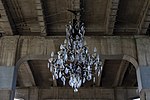Burrard Bridge

The Burrard Street Bridge (sometimes referred to as the Burrard Bridge) is a four-lane, Art Deco style, steel truss bridge constructed in 1930–1932 in Vancouver, British Columbia, Canada. The high, five part bridge on four piers spans False Creek, connecting downtown Vancouver with Kitsilano via connections to Burrard Street on both ends. It is one of three bridges crossing False Creek. The other two bridges are the Granville Bridge, three blocks or 0.5 km (0.31 mi) to the southeast, and the Cambie Street Bridge, about 11 blocks or 2 km (1.2 mi) to the east. In addition to the vehicle deck, the Burrard Bridge has 2.6 m (8 ft 6 in) wide sidewalks and a dedicated cycling lane on both sides. The architect of the Burrard Street Bridge was George Lister Thornton Sharp, the engineer John R. Grant. The bridge's two close approach spans are Warren trusses placed below deck level, while its central span is a Pratt truss placed above deck level to allow greater clearance height for ships passing underneath. The central truss is hidden when crossing the bridge in either direction by vertical extensions of the bridge's masonry piers into imposing concrete towers, connected by overhead galleries, which are embellished with architectural and sculptural details that create a torch-like entrance of pylons. Busts of Captain George Vancouver and Sir Harry Burrard-Neale in ship prows jut from the bridge's superstructure (a V under Vancouver's bust, a B under Burrard's). Unifying the long approaches and the distinctive central span are heavy concrete railings, originally topped with decorative street lamps. These pierced handrails were designed as a kind of visual shutter (stroboscopic effect), so that at a speed of 50 km/h motorists would see through them with an uninterrupted view of the harbour. The effect works at speeds from about 40 to 64 km/h.
Excerpt from the Wikipedia article Burrard Bridge (License: CC BY-SA 3.0, Authors, Images).Burrard Bridge
Beach Avenue, Vancouver
Geographical coordinates (GPS) Address External links Nearby Places Show on map
Geographical coordinates (GPS)
| Latitude | Longitude |
|---|---|
| N 49.2754 ° | E -123.1366 ° |
Address
Burrard Street Bridge
Beach Avenue
V6E Vancouver (West End)
British Columbia, Canada
Open on Google Maps










